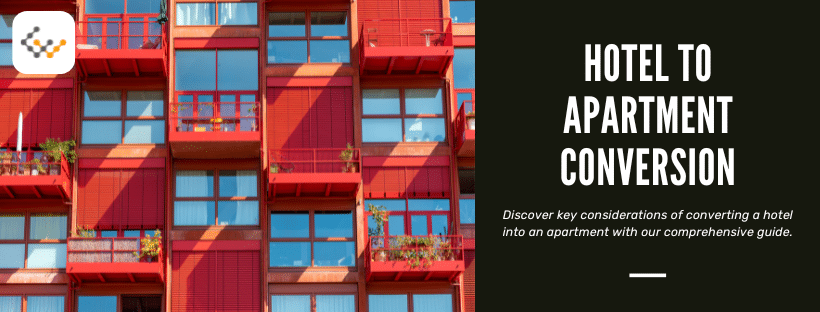Hotel to Apartment Conversion: A Guide

Investors looking for a way to transform a hotel into an apartment community may find that the premise makes good sense. While it can be a profitable move in some situations, investors must complete due diligence to understand the opportunities and limitations this process can offer fully.
Often called adaptive reuse of a property, this method can afford cities access to the housing they need faster than building a new property from the ground up. When it makes sense to do this, based on the facilities and demand, it minimizes the time required for an investor to start renting. Yet, not all properties can move through this process without extensive costs and complications. Here is what to consider.
Can a Hotel Be Converted Into an Apartment Building?
Underperforming hotels can be converted into apartment buildings in many situations. In many areas, hotel demand has dropped, leading to vacant properties and shuttered hotels dotting the landscape in many cities.
While it may be possible to consider the conversation of a hotel into an apartment building, this depends on multiple factors. First, most hotel rooms are under 500 square feet, with many around 300 square feet. The average apartment is much more at around 800 square feet or higher. This can create some complications.
Also noteworthy is that most hotel rooms do not have a kitchen. This could take additional work, as can creating bedroom spaces. In addition to this, many zoning laws could limit such conversions, which is another core reason why due diligence is so critical.
Individuals who are looking for a quick conversation may need to consider all factors and the viability of a project before proceeding.
Why Convert Hotels into Apartments?
There can be benefits to converting a hotel into an apartment community in some areas. Where feasible, it can offer several core benefits to the investor as well as to the community as a whole:
- It may help alleviate overburdened areas with shutdowns or limitedly used hotels in some key areas. This can help support better use of core real estate in those areas.
- Construction costs are typically much lower. Even for insignificant renovation projects of older properties, the cost to convert is less because the overall foundation and framework remain in place, reducing a significant amount of capital.
- It may be faster to convert than build from the ground up, depending on the work and updates that must be done.
- This method of converting hotels into homes can be a fast solution in areas with a housing shortage. It may mean there is a way to meet the demand for housing sooner in key areas where home prices rise due to limitations.
- Often, governments support the effort because it helps remove dilapidated and non-performing hotels, which can drive down community real estate value. It can also add more affordable options for renters since most properties remain smaller.
These are all valid benefits of the conversion process, but they do not always apply in every situation. Investors must weigh the benefits of such a conversion with costs, timelines, and other limitations imposed by the government and other stakeholders.
What to Consider Before Deciding to Convert a Hotel Into an Apartment?
Before making this type of investment, property buyers must consider the entire picture and all the project’s limitations to better understand potential risks. The following are some of the most common considerations, which can vary substantially from one project to the next.
Property size
Hotel rooms are sometimes tiny, which does not afford enough room for people to live comfortably. A mid-sized hotel room may convert into a basic studio rental.
Property size is not just a function. It is also essential for investors to consider whether smaller rentals are in demand or desirable within the region. In an area mostly known for college student renters, this may facilitate a better. In an area where there are mostly demands for 2-bedroom and larger apartments, studio apartments tend to be too limitedly beneficial.
Zoning allowances
Investors must talk to and research any zoning concerns that apply in the area. It is very common for cities to have particular mandates and rules in place to limit residential living in business districts. Since many hotels are located in tourism-heavy or business districts, this can create limitations for local governments.
More so, many zoning boards will have requirements on property and rental features, size, and amenities to ensure the property meets their expectations. If a multi-family zoning law requires a property to have a specific amount of floor space, that must be met, or the government must approve a workaround for this option.
The location
As noted, many hotels are in tourism or commercial enterprise areas. Transforming that space into an apartment community may be limited. The key here may be that the bigger picture needs to be considered.
If converting a hotel near a busy office building could help to give people working in that office tower easy access to their jobs, that may make sense from a demand standpoint. If the hotel sits on the waterfront overlooking the ocean, that could also be a benefit for renters. For other items, such as in business districts without access to parking, grocery stores, and other amenities, such conversions may not be ideal.
Costs
While it is typically the case that conversions of properties like this will cost less, there are no guarantees of that. If the hotel is much older and there are health code violations, problems with lead paint, or significant structural upgrade needs, that could make the project much more expensive than initially considered. Investors should complete due diligence that looks specifically at these factors, including the viability of projects when there are significant structural or code-required updates needed.
Legal restrictions
Investors also must consider any type of legal restrictions that could be in place. This includes ordinances as well as overall factors like landmark or historic register factors. This can make these properties far harder to renovate and update to meet new expectations and requirements.
Financing Options for Hotel-to-Apartment Conversion
It is possible for investors to find available loans of various forms to handle the purchase and renovation work associated with this type of project. The use of a bridge loan could be one example. Investors may wish to consider private investors as well as government loans made available to help reduce these types of properties. A comprehensive plan that outlines the profit margins and expected returns may help encourage lenders to invest in the project.
Wrapping Up
A hotel to apartment conversion is not unheard of, and in some areas this has become a welcome move because it can provide valuable, affordable housing options in areas with significant demand. It is faster and tends to be less expensive but there are limitations to these projects especially when it comes to profit margins over time. With due diligence, including in securing funding investors can make such decisions more effectively.

